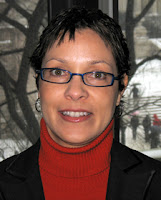
Girl with Pen’s first Guest Scholarblogger post comes to you from a researcher who happens to be a dear old friend. Introducing Rebecca London, Ph.D., Director of Research at Stanford University’s John W. Gardner Center for Youth and Their Communities. Rebecca lives on California’s central coast with her husband and two school-age daughters. She’s frequently quoted in the press as an expert on poverty, youth, and working motherhood. She makes a mean strawberry margherita. Here she is!
Mom and Dad Are Busy: Schooling Our Schools
By Rebecca London, Ph.D.
Summer is dwindling, days are getting shorter, and parents everywhere are sighing in relief as their children return to school. I was contemplating this freedom when I realized that this year, with my younger daughter headed to kindergarten at our local public school, I will have this and my older daughter’s 2nd grade class in which I’ll be expected to volunteer. (I say “I†here because it is my experience that the mother is expected, but in my family my husband and I tend to share this responsibility.) Between my nearly full-time job and my hour-long commute that can only be done off-hours, how in the world am I going to manage this?
“Parental involvement†in school is the new way of characterizing the activities performed by the PTA and room mothers from our childhoods. Now, in addition to organizing bake sales and class picnics, schools and teachers want and expect all parents to contribute, especially with their time in the classroom. There is actually a good reason for this. Several years ago the National Research Council compiled research on the characteristics of youth-serving settings that turn out the most well-developed adults (for the executive summary, click here). A key to success, it turns out, is placing youth at the center of the intersection of family and school (and also community, a topic for another post). But for this to happen, family and school need to meaningfully intersect. In many cases, they don’t.
As challenging as it is for me – with my professional job and long commute – to find time to volunteer in my daughters’ classrooms, imagine what it would be like if I had a low-wage service job with no flexibility. Or if I didn’t speak English very well or knew that my education level was lower than that of every teacher and staff member at the school. What if I felt like I was never good at school and didn’t want that to rub off on my own kids, or heaven forbid, someone else’s? These are the challenges faced by parents and schools in many disadvantaged neighborhoods, where schools struggle for lack of funds and facilities, and parents struggle to provide these same life essentials for their families. If youth are to be at the center of family and school in these communities, we need to tear down the power differentials that shield the school from its parents and create opportunities beyond helping with academics, beyond being present during school hours, and beyond contributing through fundraising. Schools need to think outside the box on this one and learn from their parents what works.
As for me, I’m thinking I will run for the school site council, a body of teachers, parents, and administrators that make governing decisions for the school. I figure that because it meets after school hours, I might actually be able to manage my service without doing time during my workday. Hopefully it will count in the race to place my own kids at the center of their intersection with family and school. And for all the other parents with less flexibility and fewer resources, may their schools figure out more feasible ways for them, too, to be involved.
Email Rebecca at rebecca_london@yahoo.com
(A note from Girl with Pen: If you are a feminist-y researcher and interested in guest blogging opportunities on this space, please email me at deborahsiege@gmail.com with a few sentences describing your idea for a post.)






